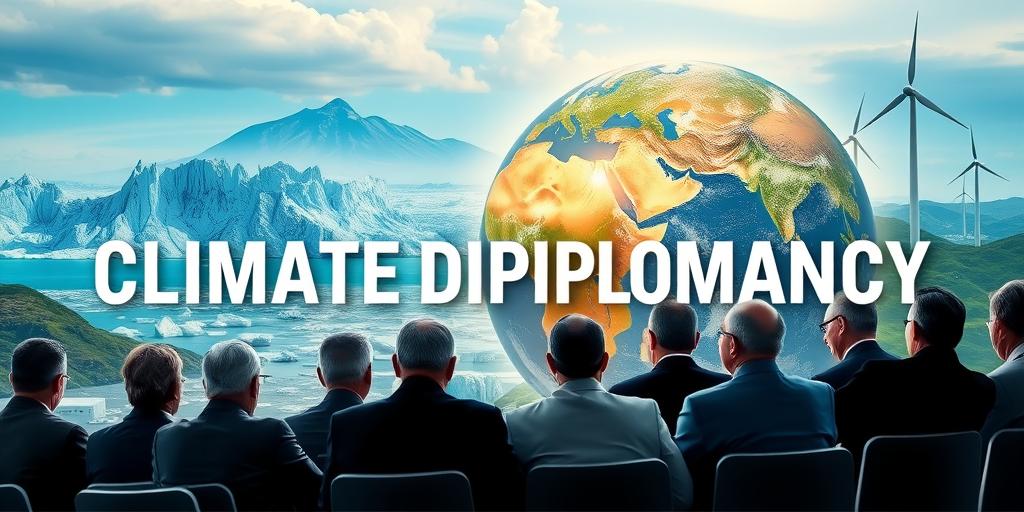Diplomacy and the Challenge of Climate Change
Climate change is a global issue that demands international cooperation. Diplomacy plays a crucial role in addressing this challenge by fostering agreements, setting targets, and promoting sustainable practices. This post explores the intricate relationship between diplomacy and climate change, highlighting the key aspects and challenges involved.
The Role of Diplomacy in Climate Action
- International Agreements: Diplomacy is essential for negotiating and establishing international agreements such as the Paris Agreement. These agreements provide a framework for countries to commit to reducing greenhouse gas emissions and mitigating the impacts of climate change.
- Setting Emission Reduction Targets: Diplomatic efforts involve countries setting emission reduction targets and developing strategies to achieve them. These targets are often part of broader international commitments and require ongoing negotiation and collaboration.
- Technology Transfer and Capacity Building: Diplomacy facilitates the transfer of green technologies and knowledge from developed to developing countries. This helps nations build the capacity to implement sustainable practices and reduce their carbon footprint.
- Financial Mechanisms: Diplomatic negotiations are crucial for establishing financial mechanisms, such as the Green Climate Fund, to support developing countries in their climate mitigation and adaptation efforts.
- Promoting Sustainable Practices: Diplomacy promotes the adoption of sustainable practices across various sectors, including energy, agriculture, and transportation. This involves sharing best practices and encouraging policy changes that support environmental sustainability.
Challenges in Climate Diplomacy
- Conflicting National Interests: Countries often have conflicting national interests that can hinder climate negotiations. Balancing economic growth with environmental sustainability requires careful diplomacy and compromise.
- Political Instability: Political instability and changes in government can disrupt long-term climate commitments. Diplomatic efforts must ensure that climate agreements are resilient to political shifts.
- Enforcement and Monitoring: Ensuring that countries adhere to their climate commitments is a significant challenge. Diplomacy plays a role in establishing monitoring and enforcement mechanisms to hold nations accountable.
- Equity and Fairness: Addressing climate change equitably requires acknowledging the historical responsibility of developed countries and providing support to developing nations. Diplomatic negotiations must address issues of fairness and justice.
- Global Cooperation: Effective climate action requires global cooperation, but achieving consensus among diverse nations with varying priorities can be difficult. Diplomacy must overcome these challenges to foster a unified approach.
Successful Examples of Climate Diplomacy
- The Paris Agreement: The Paris Agreement is a landmark achievement in climate diplomacy, bringing together nearly 200 countries to commit to reducing greenhouse gas emissions and limiting global warming.
- The Montreal Protocol: The Montreal Protocol, which addresses ozone-depleting substances, demonstrates the effectiveness of international cooperation in tackling environmental challenges.
- The Kyoto Protocol: Although it had limitations, the Kyoto Protocol was an early effort to establish legally binding emission reduction targets for developed countries.
The Future of Climate Diplomacy
The future of climate diplomacy will likely involve:
- Enhanced International Cooperation: Strengthening international agreements and fostering greater collaboration among nations.
- Innovative Financial Mechanisms: Developing new and innovative financial mechanisms to support climate action in developing countries.
- Technological Advancements: Promoting the development and deployment of green technologies to reduce emissions and enhance resilience.
- Inclusive Negotiations: Ensuring that all stakeholders, including civil society and the private sector, are involved in climate negotiations.
- Adaptation Strategies: Focusing on adaptation strategies to help communities cope with the impacts of climate change.
Conclusion
Diplomacy is indispensable for addressing the global challenge of climate change. By fostering international agreements, setting targets, promoting sustainable practices, and overcoming challenges, diplomacy can pave the way for a sustainable and resilient future. Effective climate diplomacy requires cooperation, compromise, and a shared commitment to protecting the planet for future generations.









